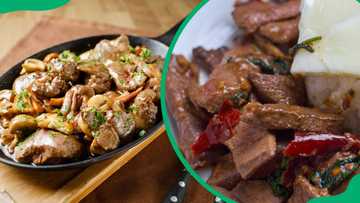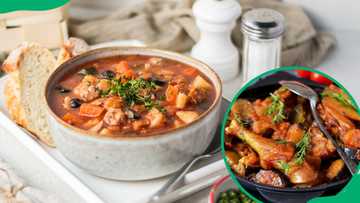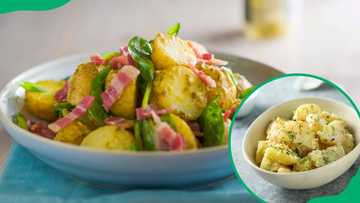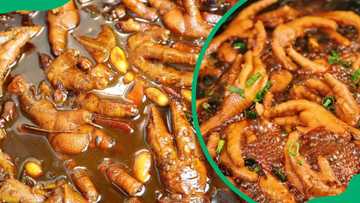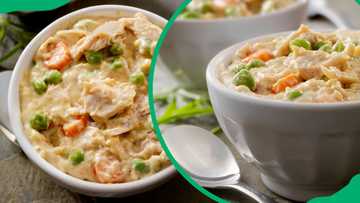Pork trotters: A delicious recipe to cook them in 5 easy steps
Pork trotters or pig's feet are popular delicacies in many cuisines worldwide. The trotters and other nose-to-tail cuts hold cultural significance and are often featured in traditional dishes. Prepare the collagen-rich delicacy in five easy steps highlighted below.
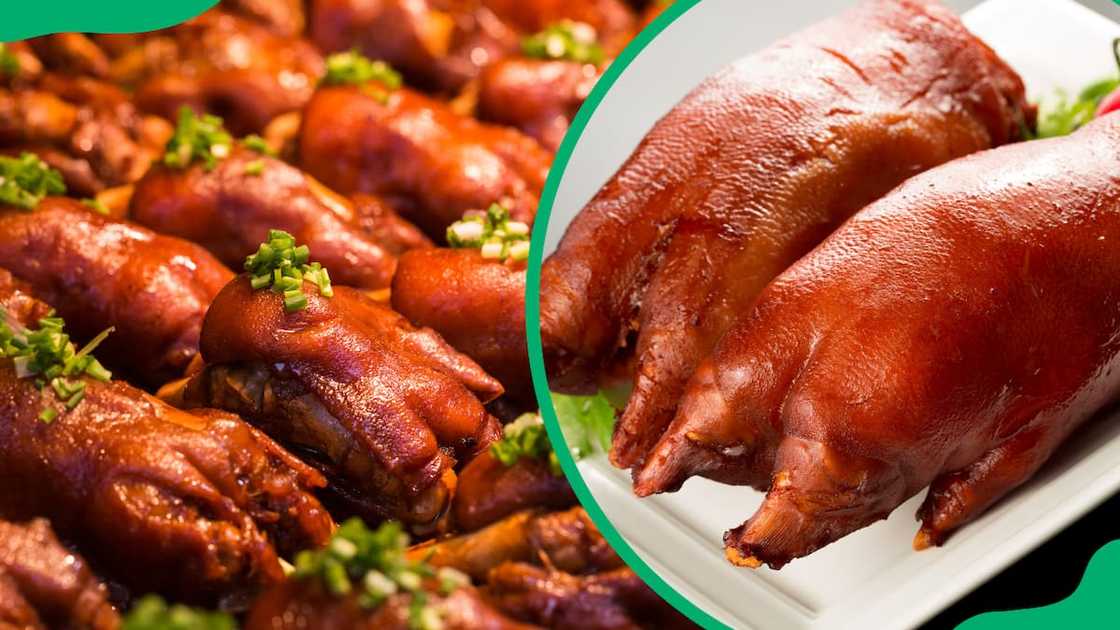
Source: Getty Images
Pig's feet can be prepared in various ways, using simple ingredients and spices. The dish is often considered a more economical choice compared to other cuts, hence affordable to consumers operating on a budget. Slow cooking methods are usually preferred for the dish due to its ability to absorb and hold onto flavours.
Easy pork trotters' recipe
Preparing pig's feet is one of the easiest cooking methods that have evolved in modern cuisines. The secret to unlocking the delicacy's rich flavours involves a combination of techniques and ingredients. Learn how to cook pork trotters in five simple steps, as shown in this recipe.
- Servings: Around 5 people
- Cooking time: About 2 hours
Ingredients
- 4 pork trotters, cleaned and cut into manageable pieces
- 2 onions, finely chopped
- 2 tomatoes, chopped
- 2 cloves garlic, minced
- 2 tablespoons vegetable oil
- 1 tablespoon curry powder
- 1 teaspoon ground coriander
- 1 teaspoon ground cumin
- 1 teaspoon paprika
- Salt and pepper to taste
- 2 cups water
- Fresh coriander leaves for garnish (optional)
Cooking instructions
- Clean the pork trotters thoroughly to remove excess hair and debris, then cut them into manageable pieces.
- Heat the vegetable oil over medium heat in a large pot or deep pan. Add the chopped onions and minced garlic, then sauté until soft and golden brown.
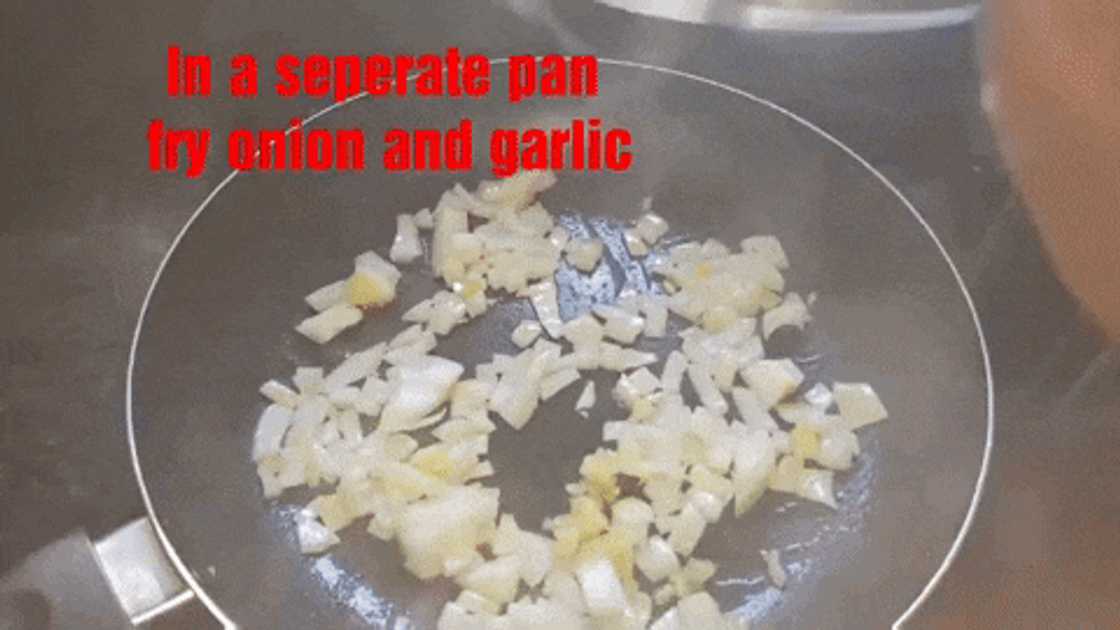
Source: UGC
- Add the curry powder, coriander, cumin, and paprika to the sautéed onions and garlic. Stir the spices well to coat the onions and garlic, allowing them to toast for about 2 minutes.
- Add the prepared pork trotters to the pot, coating them with the spiced onion mixture. Pour in the chopped tomatoes and season with salt and pepper, then cook for a few minutes until the tomatoes start to break down.
- Pour in the water and bring it to a boil, then reduce the heat to low, cover, and simmer for about 1.5 to 2 hours or until the trotters are tender and the flavours have melded. Once the trotters are cooked, check and adjust the seasoning if necessary. Serve the pork trotters over rice, samp, or your preferred side dish. Garnish with fresh coriander leaves if desired.
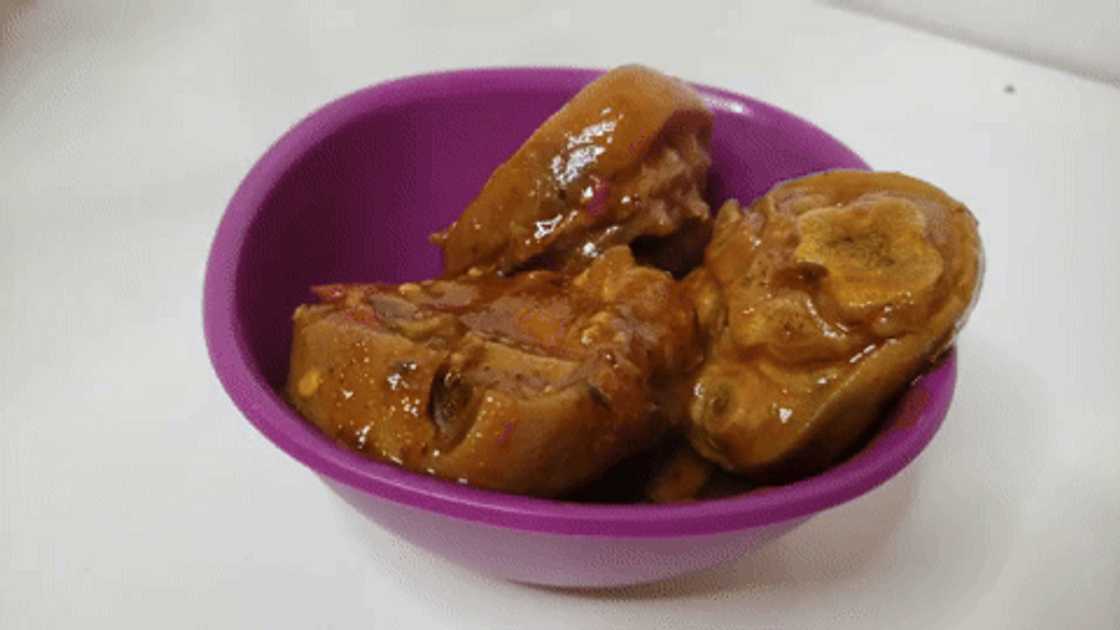
Source: UGC
Lazy Makoti Pork Trotters Recipe for South Africans
Renowned Chef Mogau Seshoene is known for her Lazy Makoti ('lazy bride' in Sesotho) platform, which celebrates recipes and cuisines from different African cultures. Below is one of her recipes for pork trotters (Ngatha), prepared in three easy steps.
- Serves: 6 to 8 people
- Preparation time: 15 minutes
- Cooking time: 2 hours
Ingredients
- 1 kg pork trotters
- 2 tablespoons vegetable oil
- 1 chopped onion
- 1 teaspoon paprika
- 1 teaspoon curry powder
- 3 cups water
- 2 cups beef stock
- 1 can (400 g) tomatoes
- Sea salt and freshly ground black pepper to taste
Cooking instructions
- Rinse the trotters thoroughly under clean, running water. Heat oil in a large saucepan and fry onions and spices until fragrant.
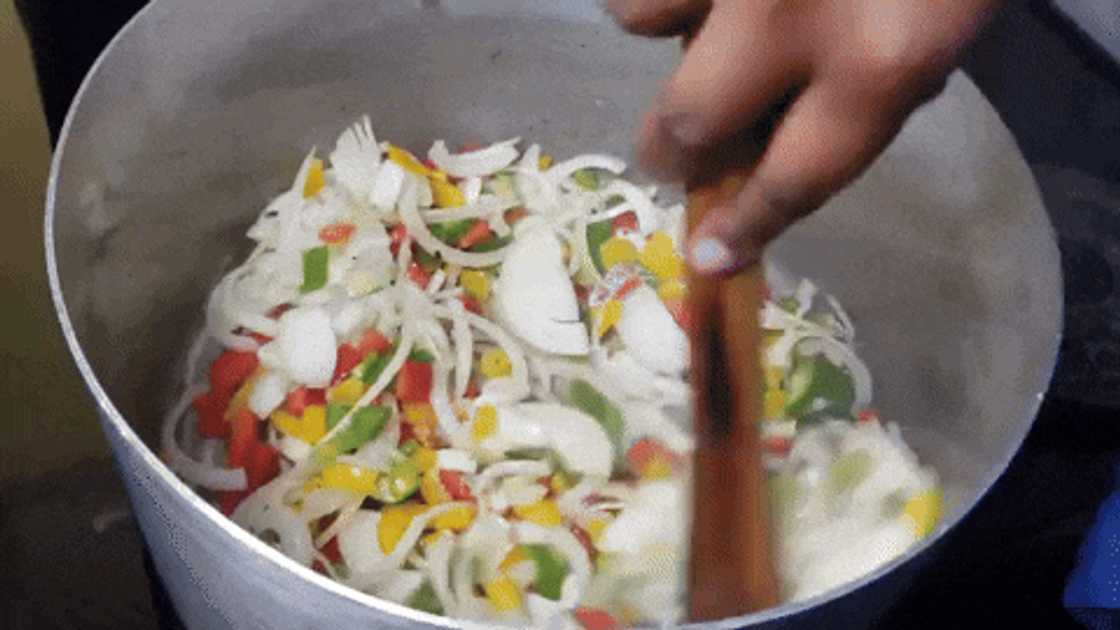
Source: UGC
- Add the trotters and saute for 10 minutes. Add the water, beef stock and tomatoes, then season with sea salt and freshly ground black pepper.
- Cover and cook for 1–2 hours over medium heat on the stove or place it in the oven preheated to 200°C until tender and falling off the bone. Top up the water as needed during the cooking process.
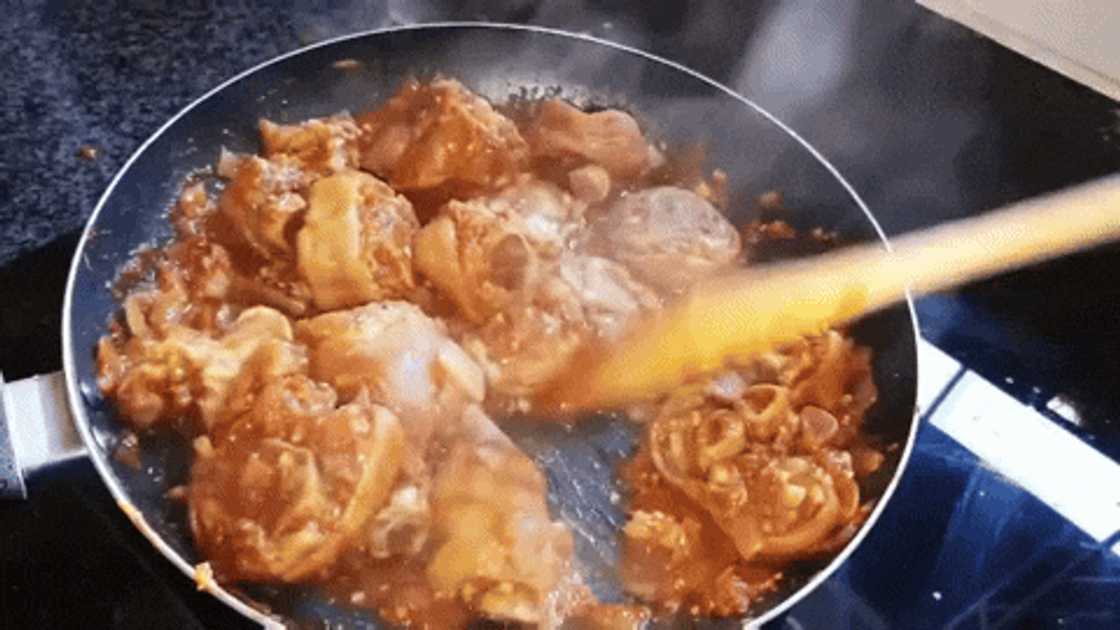
Source: UGC
Are pig's trotters good to eat?
The delicacy is good to eat in moderation as part of a balanced diet. Pig's feet are collagen-rich cuts of meat, hence a great source of proteins, which has various health benefits.
However, they have high fat and cholesterol content that may pose health problems if consumed in excess. If you have any dietary or health concerns, seek the advice of a registered dietitian or health professional.
What is the difference between pig trotters and pig legs?
Pig trotters are the feet, typically consisting of the hock joint and the lower part of the leg. They are high in collagen, which turns into gelatin when slow-cooked. The meat cut is often used in soups, stews, and braised dishes.
Pig legs are typically the hind legs, consisting of cuts like ham, pork shank, and pork hock. The meat is usually leaner compared to other cuts. It is commonly used for roasting, smoking, or curing to produce hams.
Do pig's trotters have bones?
Pig's trotters have bones. The bones are usually left intact during cooking, which contributes to the dish's overall flavour. Slow cooking or braising helps extract flavour and nutritional benefits from the bones and collagen.
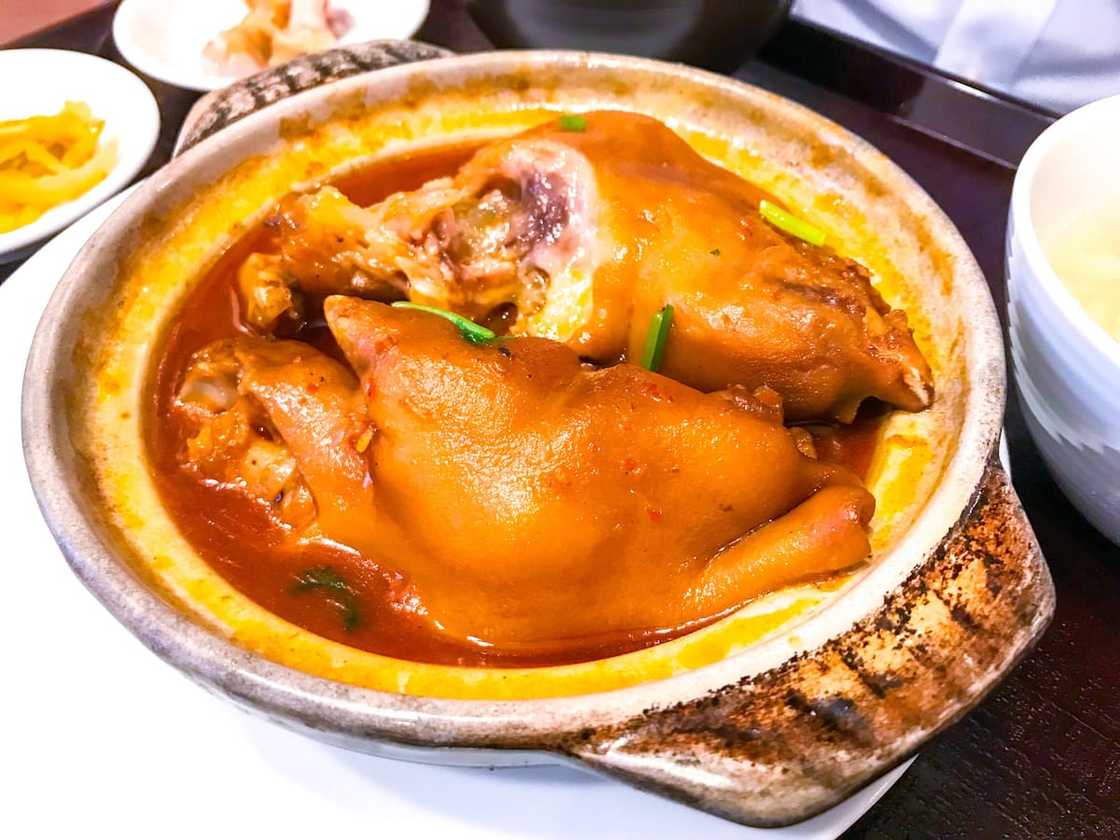
Source: Getty Images
How do you clean pork trotters?
Cleaning pork trotters is essential to remove any impurities, including dirt, hair, and nails, before cooking. Here are tips on how to clean the meat cut;
- Place the pork cuts under cold, running water to rinse off any loose dirt.
- Use a knife to trim excess fat and hair, particularly around the joints and crevices.
- Scrape the skin off the pork using a small brush or the back of the knife, then rinse again under cold, running water.
- Place the trotters in salted water with vinegar and let them soak for 15-20 minutes. This step helps draw out any remaining impurities and excess blood.
- Rinse the trotters thoroughly under cold running water to remove salt and vinegar residue.
- Pat them dry with paper towels before cooking.
What is the best cooking method for trotters?
The delicacy is often prepared using slow cooking methods to break down the collagen and create a tender, flavourful dish. Popular methods include braising, boiling, roasting, and pressure cooking.
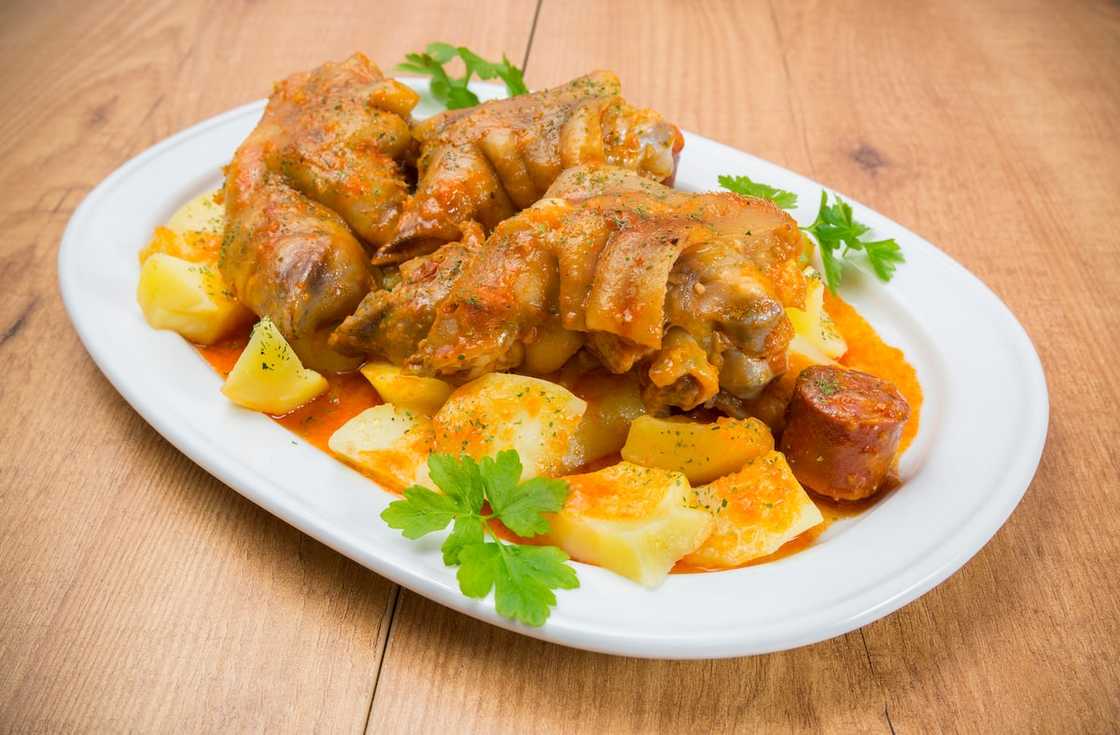
Source: Getty Images
How do you soften hard trotters?
Softening the meat cut involves breaking down the collagen and connective tissues. Here are some tips on how to make pork trotters tender;
- Soaking in salted water and vinegar helps tenderize the meat and removes impurities.
- Marinating in an acidic solution containing ingredients like citrus juice, wine, and vinegar
- Slow cooking by braising, using a slow cooker, or simmering on the stovetop for an extended period at low heat. If you are looking for a quick method, pressure cooking will be effective.
Can you soak pig feet overnight?
The pork cut can be soaked overnight in cold salted water to clean. Cover the container and refrigerate, which ensures the trotters are kept at a safe temperature while soaking.
What part of the pig is the healthiest to eat?
Leaner cuts are generally considered healthier because of their lower saturated fat content. Lean cuts of pork consist of tenderloin, sirloin, loin chops, and pork leg. Other meat cuts of pork should be enjoyed in moderation and cooked using recommended methods.
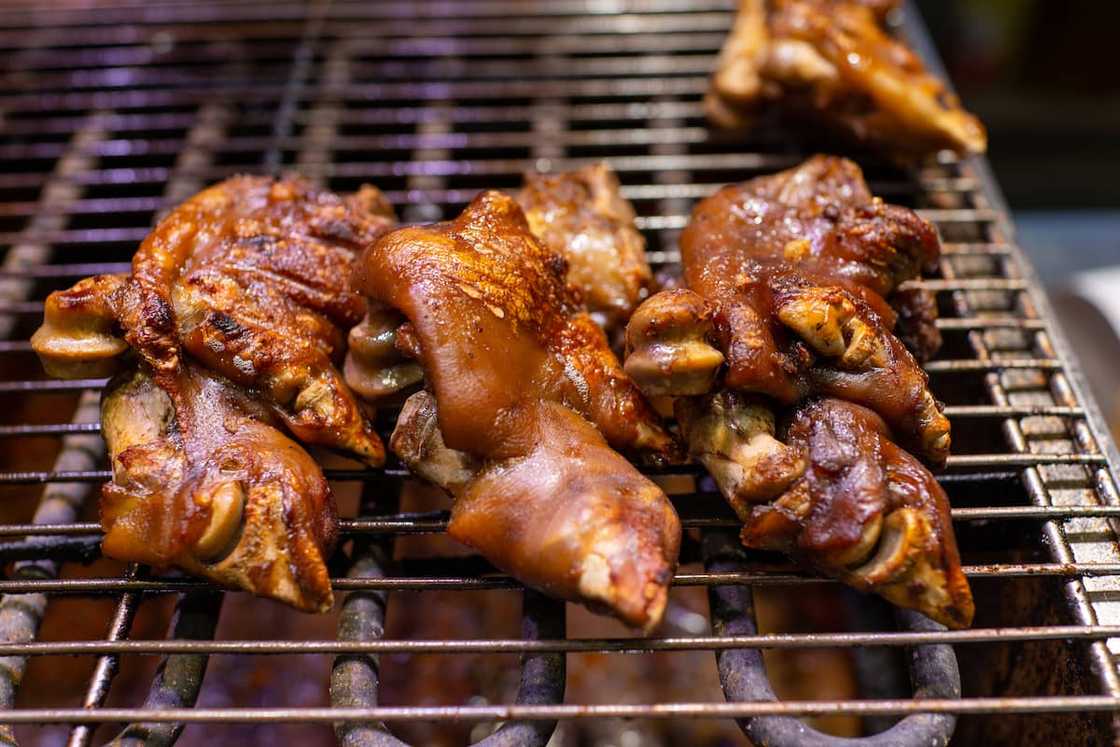
Source: Getty Images
Unlock a deep-rooted culinary tradition of nose-to-tail cooking with the straightforward pork trotters' recipe highlighted above. Adopt the recipe today to enjoy the mouthwatering taste of this often-underrated cut of pork!
READ ALSO: Simple cheese platter ideas: Create a board to surprise your guests
Briefly.co.za shared simple cheese platter ideas for parties and family gatherings. A charcuterie board offers the opportunity to showcase the rich flavours of local South African cheeses.
Cheese is a versatile ingredient in various dishes and pairs well with foods like wine, bread, nuts, and fruits. Check the article for exciting ideas on how to create a great cheeseboard.
Source: Briefly News

